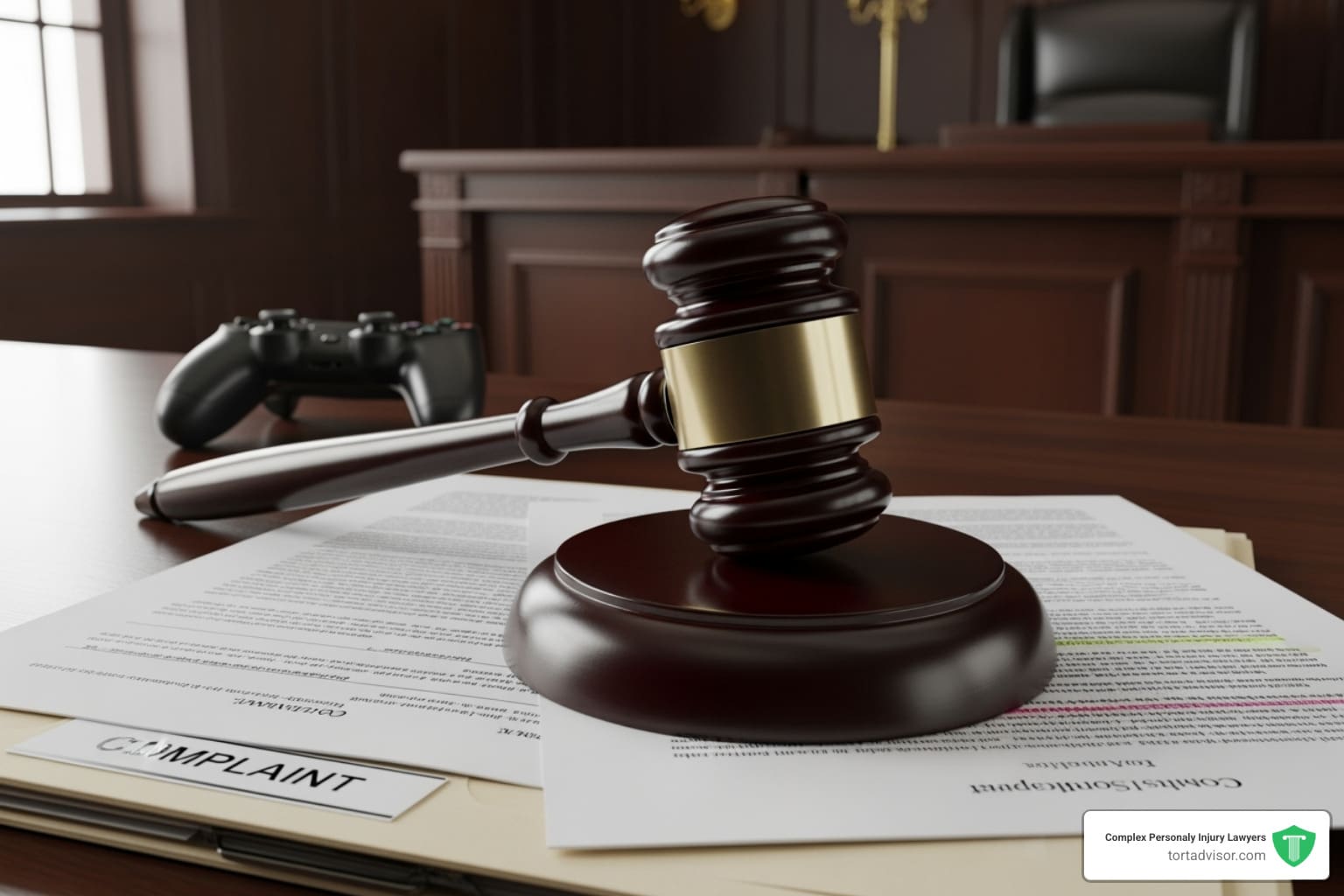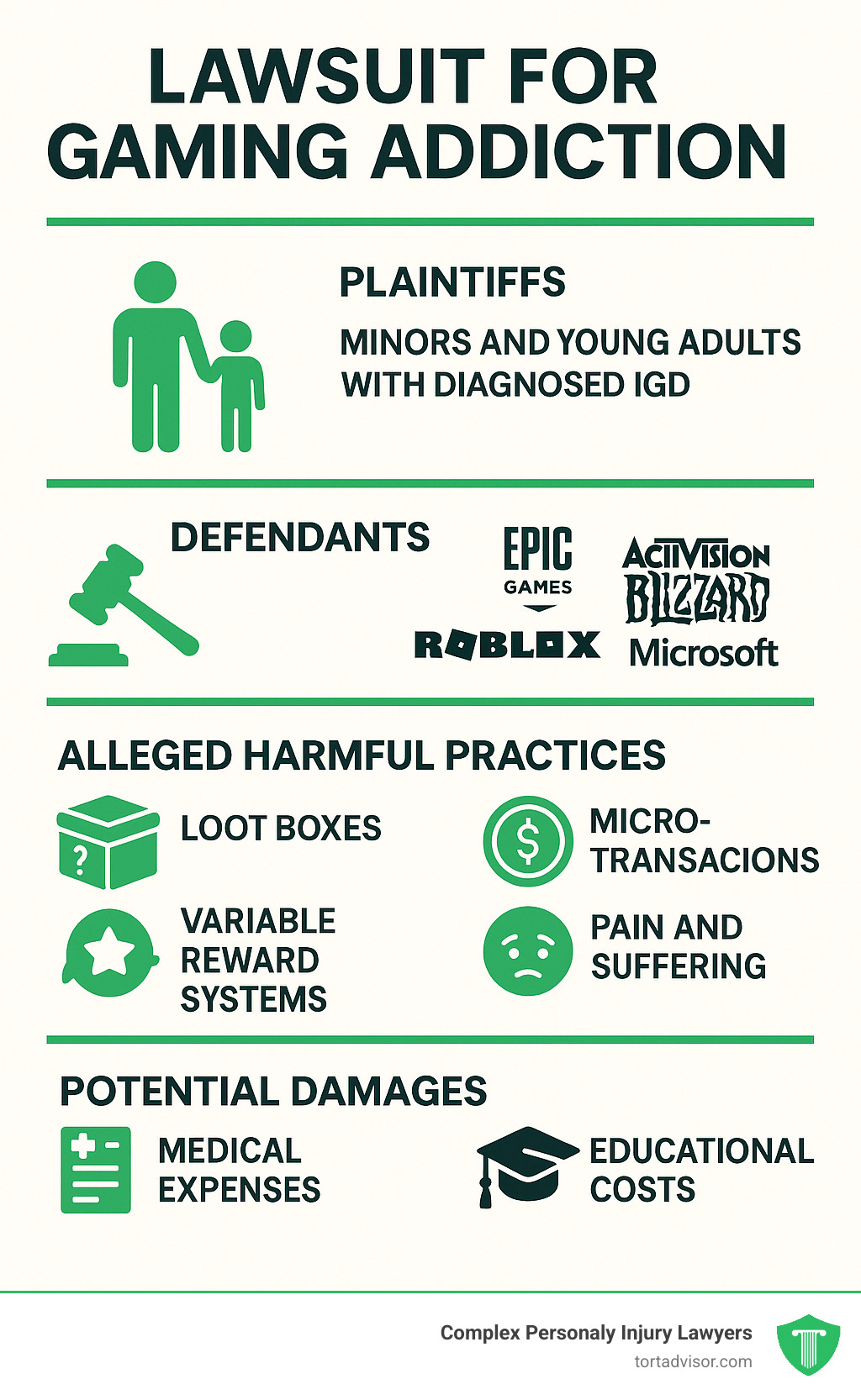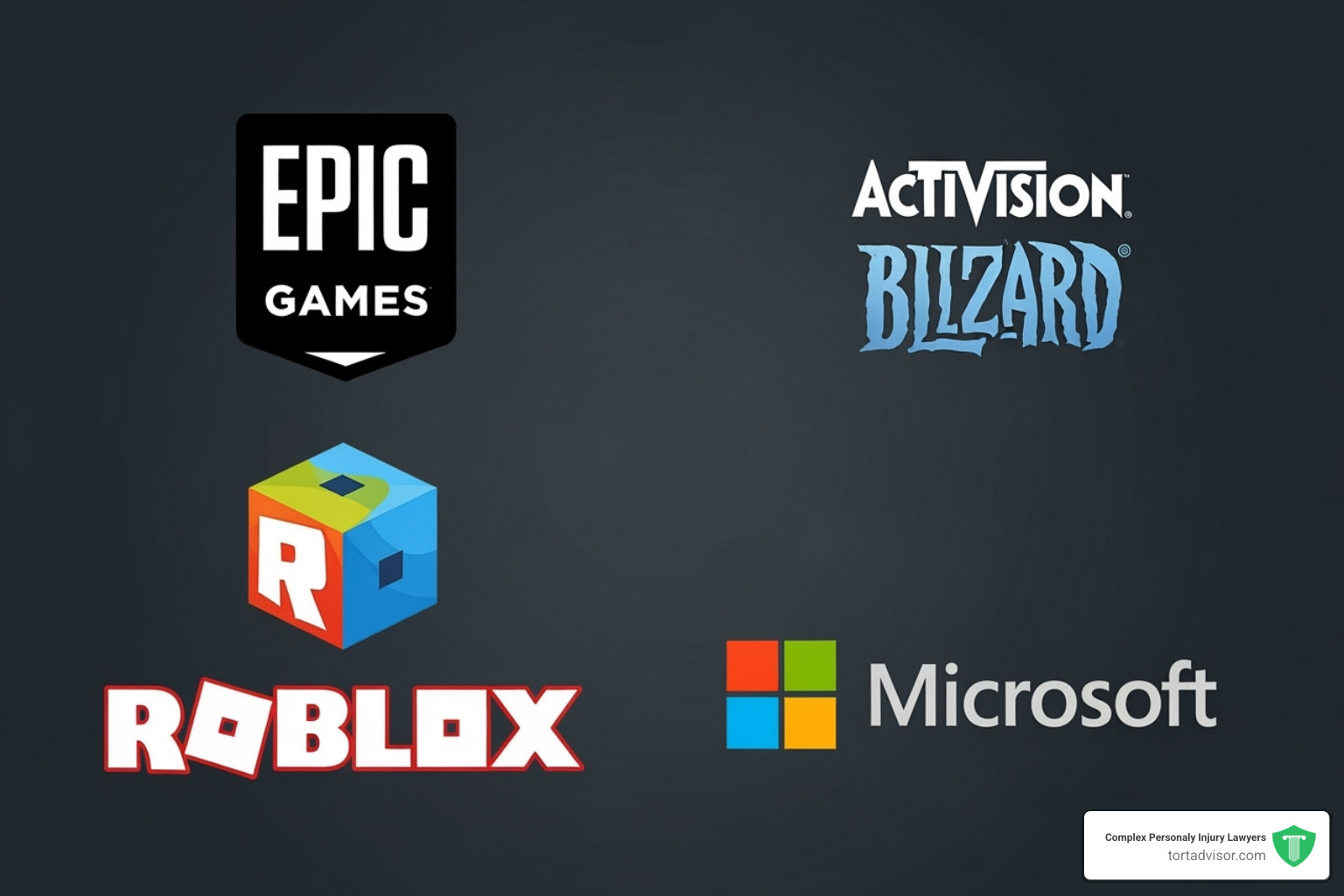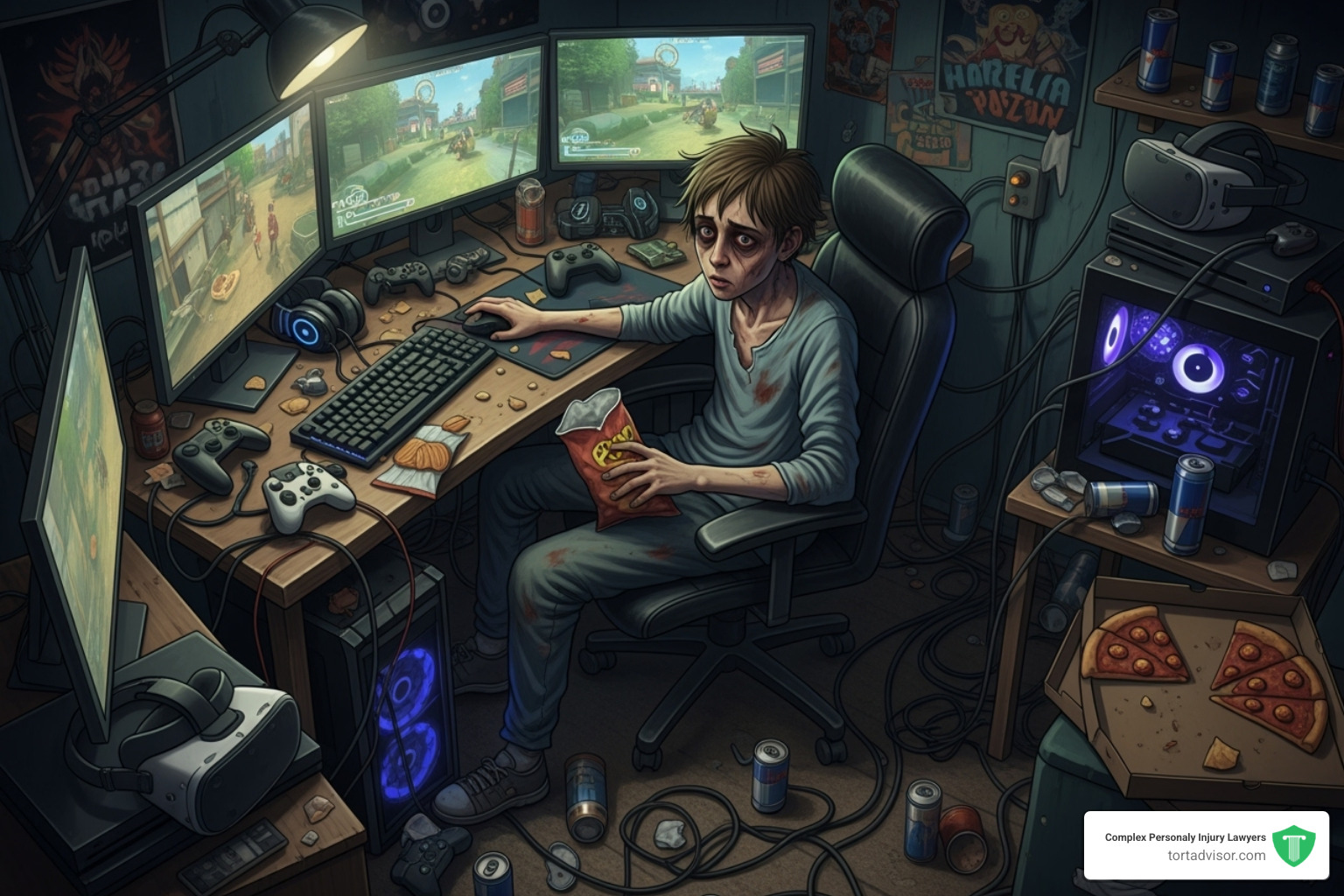


The Growing Crisis: When Gaming Becomes a Legal Battle
A lawsuit for gaming addiction is legal action against video game companies for designing intentionally addictive games, especially targeting minors and young adults. These lawsuits seek compensation for:
- Medical expenses for treating gaming addiction and related mental health issues
- Lost wages or diminished earning capacity
- Educational costs for academic setbacks
- Pain and suffering from depression, anxiety, and social isolation
- Punitive damages to hold companies accountable
While the gaming industry generated over $176 billion in 2024, a troubling reality lies behind the numbers. Families are suing major companies like Epic Games (Fortnite), Activision Blizzard (Call of Duty), and Roblox Corporation, alleging they deliberately engineered addictive products. These lawsuits claim the companies used psychological tactics like loot boxes, variable reward systems, and microtransactions to hook players, leading to significant financial and personal harm.
The stakes are high. Up to 10% of the U.S. population may be addicted to video games, with around 1.2% to 10% of adolescents in Western countries struggling with internet gaming disorders. The World Health Organization now officially recognizes gaming disorder as a mental health condition, giving these legal claims solid medical backing.
One heartbreaking example involves a California family who sued multiple gaming companies after their child, who started playing at age six, developed severe addiction symptoms including academic decline, social withdrawal, and depression.
I’m Mason Arnao. My background in technology and data systems, where I’ve seen how companies use behavioral psychology to maximize user engagement, gives me a unique insight into the tactics central to many lawsuit for gaming addiction cases.
Lawsuit for gaming addiction vocabulary:
- Lawsuit against video game maker
- Minecraft class action lawsuit
The Grounds for Legal Action: What Do Gaming Addiction Lawsuits Allege?
When families file a lawsuit for gaming addiction, they make serious accusations that video game addiction is a predictable and profitable outcome for gaming companies. The core of these lawsuits is that companies have deliberately chosen profits over player well-being.
Intentionally Addictive Design and Psychological Manipulation
A core allegation in any lawsuit for gaming addiction is that companies intentionally engineer addictive experiences. They allegedly use behavioral psychology to exploit the brain’s natural reward systems.
Game developers allegedly exploit the brain’s dopamine system. Using variable reward schedules, similar to slot machines, games deliver unpredictable rewards that release dopamine, making it hard to stop playing. A recent Jerusalem Post article explores how this dopamine manipulation can drive compulsive use. Scientists have even identified specific brain responses, like the P300-CE response, that make in-game events feel incredibly important, strengthening engagement.
Alleged design tactics include feedback loops creating artificial urgency with time-limited events, social pressure via leaderboards, and progression systems that always dangle the next achievement. Some games are accused of creating frustration that can only be solved by spending money. These are deliberate applications of behavioral science, allegedly designed to maximize the time and money players spend. For more details, you can read about how a top video game developer was hit with major lawsuits.
Predatory Monetization: The Role of Microtransactions and Loot Boxes
Microtransactions and loot boxes are central to most gaming addiction lawsuits. These monetization strategies are accused of creating gambling-like behaviors and causing serious financial harm.
Microtransactions are small in-game purchases that add up quickly. Many “free-to-play” games use this model, creating artificial barriers that encourage spending to bypass them.
Loot boxes are even more problematic, functioning like a lottery. Players spend real money on mystery boxes hoping for rare items. Research indicates a strong link between loot boxes and problem gambling.
The financial damage can be devastating, particularly with unauthorized purchases by minors. There are numerous cases of children spending thousands of dollars, like a 6-year-old who spent $16,000 on microtransactions.
This isn’t isolated; a small group of heavy spenders drives massive revenue, with microtransactions reaching $190 billion in 2021. Regulators are responding. The FTC issued $72 million in refunds for Epic Games’ billing practices, and Canadian courts have approved class-action lawsuits against Electronic Arts over loot boxes.
Who Are the Defendants? Companies and Games Under Fire
The defendants in these lawsuits are not small developers but global entertainment giants.
- Epic Games is sued over Fortnite, with allegations that its design fosters compulsive behavior in children, leading them to neglect school, sleep, and social activities.
- Activision Blizzard is accused of using psychological tactics in games like Call of Duty and World of Warcraft, particularly in their multiplayer and progression systems.
- Roblox Corp. faces serious allegations of addiction and facilitating child gambling through its popular user-generated game platform.
- Microsoft has been named in lawsuits over Minecraft, with its online and monetization features drawing legal scrutiny.
- Rockstar Games and Take-Two Interactive are also defendants, with Grand Theft Auto’s immersive online world and monetization features under fire.
These lawsuits argue that the companies prioritized profits over player well-being, especially for young people, and seek to hold them accountable for the resulting harm.
Recognizing the Harm: The Human Cost of Video Game Addiction
The lawsuits detail devastating consequences that extend far beyond the screen, affecting mental health, social development, and physical well-being. Medical organizations now formally recognize the condition, giving legal claims a solid foundation.
Defining the Condition: Internet Gaming Disorder (IGD)
When gaming crosses from a hobby to an addiction, it can devastate a young person’s life. The medical community now provides clear definitions for this condition, which is crucial for any lawsuit for gaming addiction.
In 2018, the World Health Organization included gaming disorder in the ICD-11. The World Health Organization’s criteria require gaming to cause “significant impairment” in personal, family, social, or educational areas for at least 12 months.
The American Psychiatric Association’s DSM-5 lists Internet Gaming Disorder as a condition for further study, requiring at least five specific symptoms over 12 months for a diagnosis.
IGD is concerning because it can emerge as early as age 10, with some studies showing 4% of children exhibiting clinical signs. It represents a complete loss of control where gaming becomes the top priority, overshadowing essential life activities.
Common Symptoms and Devastating Consequences
The progression from casual gaming to addiction can lead to life-altering consequences. Common warning signs include:
- Preoccupation with gaming
- Withdrawal symptoms like irritability and anxiety
- Lying about gaming time
- Neglect of personal hygiene, school, or work
- Loss of interest in other hobbies
- Continued gaming despite negative consequences
- Using games to avoid negative emotions
- Inability to control gaming duration
The consequences of gaming addiction are devastating and wide-ranging:
- Mental Health: The impact is severe. Studies show addicted adolescents face double the risk of depression and anxiety. A study from the National Institutes of Health links gaming addiction to suicidal ideation, and other research suggests a potential increased risk of psychosis in adulthood.
- Educational and Social Devastation: This is common, with students’ grades plummeting or dropping out of school. Real-world relationships deteriorate as virtual connections are prioritized, leading to profound social isolation.
- Financial Strain: This arises from microtransaction spending and costs from neglected work or education. Unauthorized purchases by minors can be particularly devastating to family finances.
- Physical Health Problems: These include repetitive strain injuries like carpal tunnel syndrome, chronic digital eye strain, and severe sleep deprivation. For some, games can even trigger seizures.
- Aggressive Behavior: Severe “gamer rage” can also result, leading to explosive anger and property damage in response to in-game frustration or interruptions.
These interconnected consequences demonstrate why gaming addiction has become a serious public health concern. If you’re dealing with similar issues involving other digital platforms, you might want to learn about social media addiction as well.
Navigating the Legal System: Your Guide to a Lawsuit for Gaming Addiction
Understanding your legal rights is the first step toward holding companies accountable. While the legal landscape is evolving, clear pathways are emerging for victims and their families to seek justice and compensation.
Who Is Eligible to File a Lawsuit for Gaming Addiction?
If gaming addiction has affected your family, you may be eligible to file a lawsuit for gaming addiction. Not everyone who plays excessively will qualify. Attorneys look for specific criteria to build a strong case:
- Age: Cases typically focus on individuals 24 or younger, as developing brains are more vulnerable to manipulative design tactics.
- Diagnosis: A formal diagnosis of Internet Gaming Disorder (IGD) from a medical professional is crucial. It provides the necessary medical foundation for a legal claim.
- Evidence of Harm: You must demonstrate significant damage. This includes medical bills for treatment, academic records showing a decline, and financial records of in-game spending.
- Testimony: Personal testimony from family and friends about behavioral changes and social withdrawal is also compelling, as are records of physical ailments caused by excessive gaming.
Time is a critical factor, as statutes of limitations vary by state. Contacting an attorney promptly is the best way to preserve your legal rights. If you’re wondering about the legitimacy of these cases, you can read more about whether a video game addiction lawsuit is legit.
Current Status and What to Expect: Individual vs. Class Action Lawsuits
While many assume these are class action lawsuits, the reality is more nuanced, with individual claims often being more beneficial for victims. Currently, there is no national class action lawsuit for gaming addiction in the U.S., as a motion to create a Multidistrict Litigation (MDL) was denied.
Individual cases allow for a focus on the specific harm you suffered, which can lead to better compensation than a one-size-fits-all class action settlement. Some state-level coordination, like JCCP No. 5363 in California, helps handle similar cases efficiently while preserving individual recovery potential.
The legal process begins with filing a case, followed by a findy phase. During findy, both sides exchange information through written questions, document production, and depositions. Your attorney may subpoena internal documents from the gaming companies. Expert testimony from psychologists and other specialists plays a huge role. Most cases end in settlement negotiations, but your attorney should be prepared for trial if a fair settlement isn’t reached.
Damages and Potential Compensation in a Lawsuit for Gaming Addiction
When considering a lawsuit for gaming addiction, it’s important to understand the potential compensation. The amount depends on the specific harm suffered.
Compensatory damages are designed to cover your actual losses, which can include:
- Medical Expenses: Costs for addiction treatment, therapy, and medication.
- Educational Costs: Expenses for tutoring, repeated courses, or delayed graduation.
- Lost Wages: Income lost due to the inability to work or diminished future earning capacity.
- Rehabilitation Costs: The cost of specialized gaming addiction programs.
- Pain and Suffering: Compensation for mental anguish and diminished quality of life.
Punitive damages may also be available to punish the company for egregious conduct and deter future wrongdoing.
Potential compensation varies by case severity. Settlements might range from $25,000-$90,000 for minor cases to $100,000-$250,000 for moderate cases. Severe cases involving major disruption or mental health consequences could see compensation from $250,000 to over $500,000, especially in the most extreme circumstances. Every situation is unique, and these are only estimates.
Frequently Asked Questions about Gaming Addiction Lawsuits
How much does it cost to hire a lawyer for a video game addiction case?
Most personal injury attorneys handle lawsuit for gaming addiction cases on a contingency fee basis. This means you pay no upfront costs. The lawyer’s fee is a percentage of the settlement or award they win for you. If you don’t win your case, you don’t pay any attorney fees. This system removes the financial risk and allows you to take on large gaming companies without worrying about legal costs.
What kind of evidence is needed for a lawsuit?
Building a strong case requires several types of evidence:
- Medical Documentation: Records diagnosing Internet Gaming Disorder (IGD), therapy notes, and treatment plans.
- School Records: Report cards showing declining grades, attendance records, and teacher notes.
- Financial Statements: Bank or credit card statements showing in-game purchases and spending patterns.
- Personal Testimony: Statements from family and friends about behavioral changes, social withdrawal, and other impacts.
- Expert Witnesses: Testimony from psychologists, neuroscientists, or even former game developers can also be used to strengthen a case.
How long do these lawsuits take to resolve?
The timeline for a lawsuit for gaming addiction can range from several months to a few years. The duration depends on several factors:
- Case Complexity: These cases involve sophisticated arguments and an extensive findy process.
- Defendant’s Strategy: Some companies may settle quickly, while others may choose to fight the case, extending the timeline.
- Court Schedules: Busy court dockets can cause delays.
While the process can be long, the goal is to secure the best possible outcome. Your attorney will keep you informed of the timeline and any developments.
Conclusion: Taking the First Step Towards Justice
The rise of lawsuit for gaming addiction cases is a wake-up call to the gaming industry. These lawsuits argue that the struggles of addicted players are not personal failures but the predictable result of deliberate, manipulative game design.
Major companies like Epic Games, Activision Blizzard, and Roblox face serious allegations of using psychological tactics to create and monetize addiction, especially in young people. These lawsuits claim billion-dollar corporations prioritized profits over the well-being of their users.
If your family has been affected, you know the devastating toll: declining mental health, social withdrawal, academic failure, and financial strain. These lawsuits allege such outcomes are the intended consequences of addictive design.
You don’t have to face this alone. Pathways to justice are emerging as the legal system catches up. With gaming disorder now recognized as a medical condition by the WHO and regulators like the FTC taking action, courts are allowing these cases to proceed.
These are complex cases against powerful companies, making it crucial to have an experienced attorney. Tort Advisor specializes in connecting families like yours with skilled lawyers who have the resources to handle these challenging lawsuits.
Don’t let another day pass wondering “what if.” The companies behind these games have teams of lawyers protecting their interests. You deserve the same level of representation fighting for yours.
If you or a loved one has suffered, learn more about filing a Video Game Addiction Lawsuit and get a free case evaluation.
Free Confidential Case Evaluation
Complete the short form below to get an immediate FREE case review with an expert in your specific claim. Don't wait, your case could be time sensitive to file a claim.
Related Posts
Did a North Dakota product cause harm? Understand product liability, your rights, and how to take action for defects.
Get justice for clergy abuse. Find an expert Priest abuse lawyer to navigate complex laws and hold institutions accountable.
Diagnosed with meningioma after Depo-Provera? Understand potential Depo-Provera lawsuit settlements, risks, & how to claim compensation.
Uncover the truth about uber sexual assault cases. Learn about the alarming scale, Uber's accountability, and legal options for justice.
Facing wildfire losses? Discover the best wildfire lawsuit attorneys in California to fight for your full recovery and justice.
Exposed to Roundup & diagnosed with NHL? Discover how to sue Monsanto, understand eligibility, & seek compensation. Your guide to justice.










